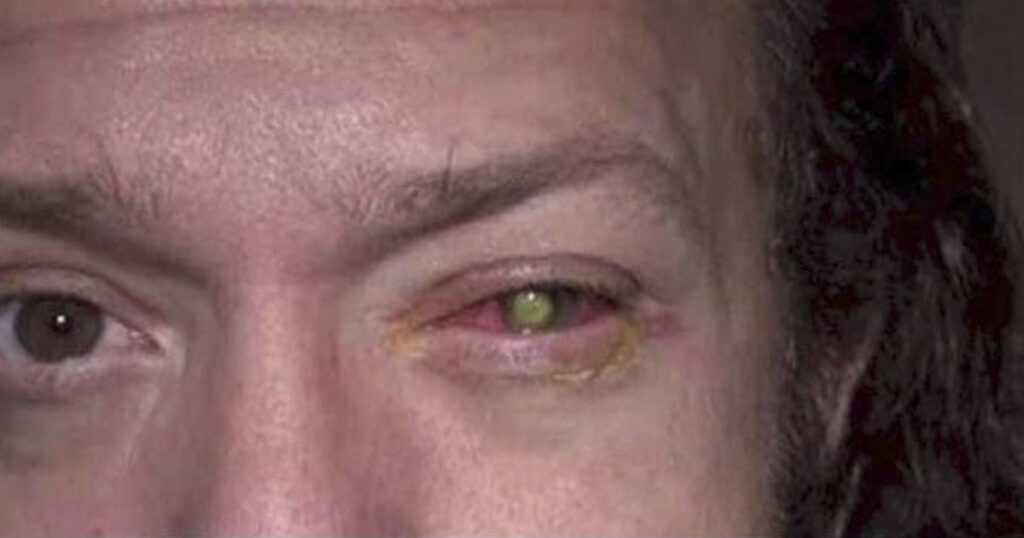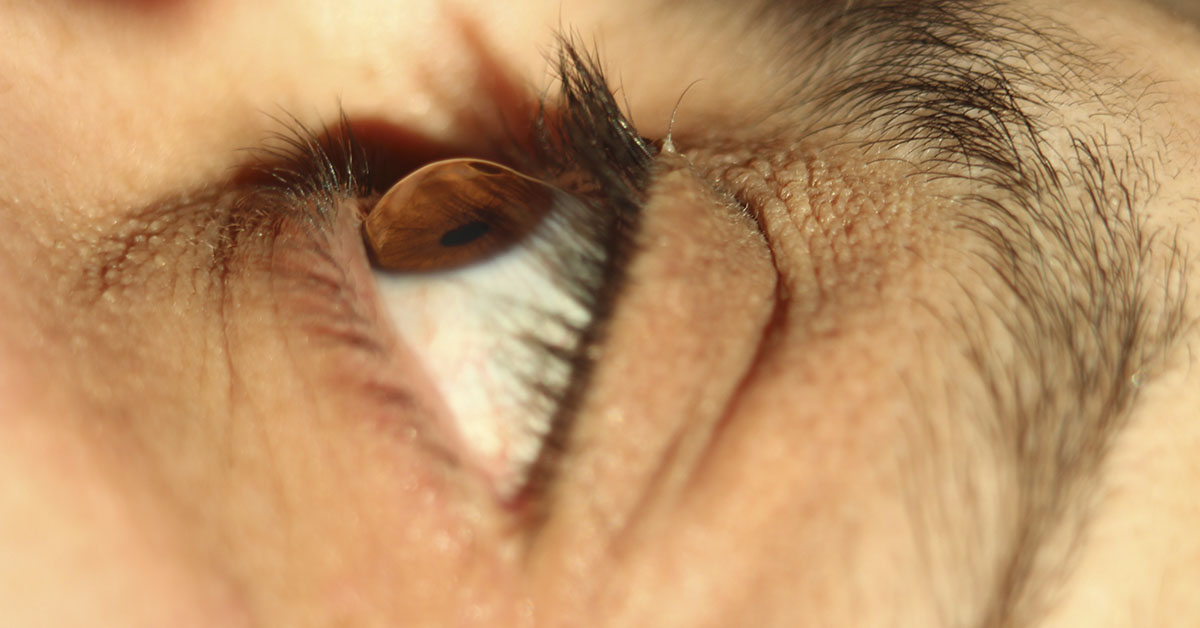Chad Groeschen lived through every contact lens user’s worst fear. He fell asleep with his lenses in and lost sight in one eye. He was 39 years old then but had begun wearing contacts when he was 18. But a year prior, he had begun wearing extended day and night lenses. Groeschen had no clue his eyes suffered damage from sleeping with contacts in — until he woke up with his vision “clouded over.”
Groeschen’s doctors said he had contracted a dangerous bacterial infection in his eye from sleeping in his contacts. The infection caused damage to his cornea. “For about three weeks, it was almost like an 8-inch nail being driven into my face, my eye,” said Groeschen. “Literally there was no escaping. Looking at a light hurt.”

After this experience, Groeschen retained only 20% vision in his infected eye, and he can still see light and color. He may eventually need a cornea transplant, but his doctors believe his outcome could have been far worse. “I had no idea something like this could happen so fast,” Groeschen said. “I feel very fortunate that I was able to get in here as soon as I did, because I do believe they saved my eye.”
“Twenty thousand patients a year develop a pseudomonas infection in the United States,” said ophthalmologist Dr. William Faulkner. “If it’s left untreated, it can actually cause a person to completely lose the eye.” There are different ways to contract eye infections but sleeping in lenses is one of them. In fact, when it comes to pseudomonas infections, the risk is “over 10 times greater for patients who sleep with their lenses,” according to Dr. Faulkner. The risk still applies for contacts intended for extended use, as exemplified by Groeschen. [1]
What Happens While Sleeping With Contacts In
Eyes come into contact with bacteria everyday without resulting in infections. That’s because the cornea protects the eye from contaminants, but it needs proper hydration and oxygen to function properly. During the day, blinking keeps in the moisture, and tears draws in oxygen. Contact lenses cover the cornea and reduce access to oxygen and moisture. But while asleep, that reduction becomes even more severe and the lack of oxygen prevents the cornea cells from fighting bacteria. Additionally, the lens could collect germs and debris during the day, furthering the risk of infection.
“Any time you choose to sleep in a contact lens, whether it’s approved for continuous or extended wear, you put yourself at greater risk for a contact-lens-related complication,” said Samuel D. Pierce, OD, an optometrist based in Alabama and former president of the American Optometric Association (AOA). “Just because the material is porous enough to allow enough oxygen doesn’t mean that [sleeping in them] is the best thing to do. You have no idea what that contact lens has come into contact with, which would be spending the night in your eye.” [2]
“But I’ve Never Had a Problem Before”
A case similar to Groeschen’s occurred in 2019. A woman in North Carolina slept in her contact lenses and woke up with her eyes feeling irritated. She went to her local urgent care who diagnosed her with a small pseudomonas ulcer. They gave her antibiotics and she woke up the next day, blind in that eye, with an enlarged ulcer. This infection had eaten away at her cornea and severely damaged her vision in the 36 hours from when she initially felt the symptoms until she met with Patrick Vollmer, OD, of Vita Eye Clinic in Shelby, NC. He later published a Facebook post about the case, warning people to remove their lenses before bed. Although the woman’s eye began to improve after treatment, Vollmer predicted she’d suffer from some form of residual vision loss in the future. [3]
“‘I sleep in my contacts all the time and I’ve never had a problem,’” he began his now-viral post. “As an eye doctor, I literally hear this daily.” He went to state that he doesn’t recommend sleeping in any brand of soft contact lenses. “The risks outweigh the benefits every time. It takes seconds to remove your contacts but a potential lifetime of irreversible damage if you choose to leave them in.” He wanted to raise awareness to these easily-preventable infections, especially because many people choose to sleep in contact lenses and are convinced this issue will never happen to them. “The odds of infection are much better than playing the lottery,” Vollmer said. “I don’t know why you’d gamble with your eyesight.” [4]
How to Care for Eyes and Contact Lenses
If you accidentally fall asleep wearing contacts, remove them immediately. If your eyes are too dry to remove them easily, don’t force them. Lubricate your eyes with a sterile contact solution before trying again. Avoid wearing contacts again for the next 24 hours, and be mindful of how your eyes feel. If you experience blurred vision, excessive watering, eye discharge, and redness, seek out an eye doctor immediately. Bring your contact lenses in a plastic container to be tested for infections.
The American Academy of Ophthalmology advises the following to keep contacts — and thereby the eyes — clean and healthy.
- Don’t swim or wade in a hot tub wearing contacts.
- Wash your hands with soap and water before handling the lenses.
- Use contact lens solution (never water or saline solution) to rinse and store the lenses.
- Replace the solution in the lens containers every day. Don’t just “top it off”.
- Replace your lens case at least every three months, or when the current case becomes broken. [5]
Keep Reading: Boy Comes Dangerously Close To Losing Vision After Playing With Bath Toys, Mother Warns
Sources
- “Man goes blind in 1 eye after sleeping in contact lenses.” ABC13. Reena Nina. A
- “What Happens if You Sleep With Contacts.” Health. Amanda Gardner.
- “Viral Post Shows Risk of Sleeping in Contacts.” WebMD. Debbie Koenig.
- Patrick Vollmer, OD. Vita Eye Clinic Facebook.
- “Why Sleeping in Contacts May Endanger Your Eyes.” Healthline. Rebecca Joy Stanborough. J

